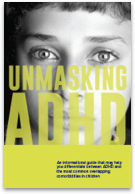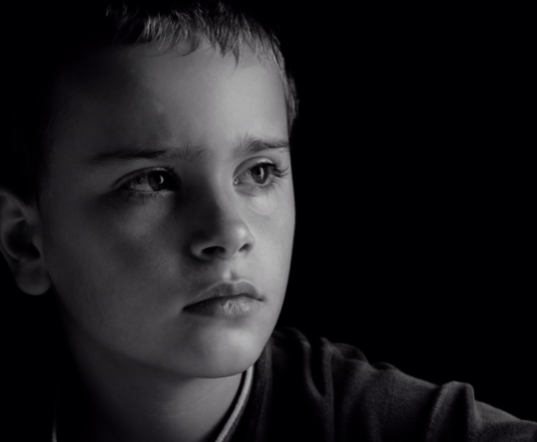OTHER IMPAIRMENTS
Impairments in executive function may be a hallmark of ADHD1
In addition to mood disorders, children with ADHD can also experience developmental and motor impairments as well as sleep disturbances.2-4
Developmental Impairment
Studies have shown that approximately 50% of children with ADHD show some level of motor impairment3,5
Research indicates that children with ADHD develop 2 to 3 years more slowly than their neurotypical peers2
Children with ADHD also tend to6:
- Get poorer grades
- Score lower on standardized tests
- Have poorer educational outcomes overall compared to those without ADHD
These differences in development may be due to the fact that the core symptoms of inattention and impulsivity result in lessened motivation and task persistence needed to facilitate learning behaviors.6
Children with ADHD often have issues with higher-order, goal-directed neurocognitive processes, including:
- Cognitive inhibition (resisting distractions)1
- Executive Function (EF) deficits. EF represents a set of cognitive Task switching1,7
- Working memory1,7
- Response inhibition and execution7
Additionally, children with ADHD frequently exhibit difficulties in language acquisition, including both receptive and expressive language7
- While simple word fluency may not be obviously impaired in ADHD, complex verbal fluency and discourse organization are more likely to be affected
- The lessened capacity of children with ADHD to maintain internalized (self-directed) speech has also been linked to uninhibited behavior, making it more difficult for these children to follow rules and instructions
Difficulties with emotional regulation may lead children with ADHD to struggle in important areas of social relatedness, including8,9:
- Making new friends
- Appropriately reading social cues10
- ”Fitting in” with peers
Issues with social functioning, together with behavioral regulation, cause difficulties in the school setting and can limit academic achievement for children with ADHD.10,11
Motor Skill Impairments
The role of ADHD on motor control
Executive function contributes flexibility and fluency to motor control7
This means children with ADHD who have deficiencies in executive function may lack the ability to appropriately modulate motor responses.7
An “overflow” of gross motor movement is often seen in ADHD, making children with the condition more vulnerable to accident and injury7,12
Motor speed and dynamic balance (which is involved in activities such as jumping) are generally affected in children with ADHD, as is fine motor coordination.3

Sequencing of simple motor movements into complex patterns and arrangements is frequently difficult for pediatric patients with ADHD.7
The manual dexterity involved in handwriting in particular is impacted, with ~60% of children with ADHD exhibiting poorer handwriting than non-ADHD peers.5
- Children with more severe hyperactive symptoms tend to have poorer visual-spatial skills, which correlate with difficulties in written ability5
- Handwriting may be labeled as “messy” or “careless” by teachers or parents, leading to issues with self-confidence5
Mild deficits in motor skills have been shown to improve with pharmacologic treatment of ADHD, even normalizing in those with mild symptoms.3
Tic disorders and Tourette syndrome are more common in children with ADHD, occurring in up to 30% of patients.13
The presence of tic disorders makes the treatment plan for children with ADHD more complex.
- Prolonged observation may be needed to differentiate “fidgeting” seen in ADHD from bouts of multiple tics10

Although stimulants are often considered first-line treatment in ADHD, they may be contraindicated in patients with tic disorders/Tourette syndrome14
ADHD and sleep disturbances
ADHD is commonly associated with disturbed sleep4

Based on parent reports, children with ADHD are 2 to 3 times more likely to experience sleep disturbances vs their neurotypical peers.15 Data indicate that 62% of pediatric patients with ADHD have moderate to severe sleep problems,4 including:
- Circadian-based phase delays16
- Nighttime awakening4
- Restless leg syndrome and/or periodic limb movement disorder4

The American Academy of Pediatrics recommends screening for symptoms of primary sleep disorders16
ADHD and sleep disturbances share a common neurobiologic etiology4,17
Overlapping areas of the brain are implicated in both ADHD and sleep dysfunction
- The dorsolateral and ventral prefrontal cortex, brain regions involved in ADHD, also regulate arousal and are sensitive to sleep deprivation18
- Delayed response to melatonin and dysfunctional thermoregulation, which cause sleep dysfunction, have been identified in patients with ADHD19
Insomnia in ADHD has been shown to worsen ADHD symptoms
While it can be difficult to know what is causing a lack of sleep for your patients, we do know that insomnia can worsen ADHD symptoms.4 Shorter sleep duration has even been shown to predate the onset of clinical symptoms of ADHD.18
- Disturbed sleep patterns may lead to daytime sleepiness, which in turn exacerbates ADHD symptoms, behavioral difficulties, and functional impairment4
- Research has shown that ADHD severity, especially the severity of hyperactivity, is associated with both the current and persistent presence of sleep problems20
In particular, difficulty with sleep initiation and maintenance and shortened sleep duration are associated with more severe hyperactivity in ADHD.20
Common Comorbidities in Comorbid Complex ADHD: Prevalence, Age of Onset, Diagnosis, and Clinical Implications
Dr. Cutler, associate clinical professor in the Department of Psychiatry, SUNY Upstate Medical University in Syracuse, NY, discusses comorbid complex ADHD—prevalence, age of onset, diagnosis and clinical implications.
Hello, I'm Dr. Andrew Cutler, associate clinical professor in the Department of Psychiatry, SUNY Upstate Medical University in Syracuse, New York. And I'm pleased to be discussing comorbid complex ADHD – prevalence, age of onset, diagnosis, and clinical implications.
Comorbid complex ADHD is very common — studies show that three- quarters of individuals with ADHD have at least one psychiatric condition, and 80% of those have more than one comorbidity. 1
But why do people with ADHD have comorbidities? It’s possible that one disorder is a precursor to the other (evolving over time), it could be a risk factor for developing the other, or they may have a common genetic basis. Some comorbid disorders (such as depression and anxiety) may develop due to the impact of ADHD, making it a secondary condition. 2,3
The comorbidity profile can change throughout the lifespan. In children and adolescents, studies have shown a high incidence of oppositional defiant disorder, which decreases in adulthood. However, in adults, we see problems with emotional dysregulation, stubbornness, trouble managing anger, and other negative emotions. In addition, those comorbidities that tend to be less common in childhood, such as conduct issues, anxiety, major depressive disorder, and substance use disorder, increase in incidence through adolescence, and into adulthood.
The cumulative burden of comorbid complex ADHD evolves and accumulates throughout the lifespan. For example, although oppositional defiant disorder is the most common comorbidity in children, conduct disorder and anxiety are also seen, with the impact of these, along with ADHD, resulting in low self-esteem in this age group. Moving from childhood into adolescence and adulthood, oppositional defiant disorder and conduct disorder decrease, but criminal behaviors start to show, with antisocial personality disorder becoming more common. In addition, learning delays in childhood develop into complex learning difficulties in adolescence and adulthood. With this progression, people often become demoralized and frustrated, resulting in lack of motivation and under achievement. Substance abuse comes into play as well. 2,4-8Es
The presence of comorbidities in different age groups can complicate the diagnosis of ADHD, as symptoms of these comorbidities often overlap with symptoms of ADHD. For example, ADHD symptoms of restlessness, agitation, difficulty concentrating, and decreased attention are also seen in major depressive disorder, bipolar disorder, anxiety, substance use disorder, and sleep disorders; and the ADHD symptom of impulsivity [activate slide build] is also seen in conduct disorder, bipolar disorder, and substance use disorder. 2,9
So, given the overlap of symptoms of ADHD and its comorbidities, what are the steps to ensure an accurate diagnosis? First, it's important to establish the diagnosis, by confirming that the individual meets DSM-5 criteria for ADHD. Then, you should rule out alternative explanations for the symptoms. Finally, and as we've already talked about, it's important to assess for comorbid conditions, which may affect the treatment of ADHD, as well as the diagnosis. 10
For example, to differentiate ADHD from depression, it is necessary to identify which symptoms of depression overlap with ADHD and which are distinct. Overlapping symptoms include loss of motivation, problems concentrating, and restlessness or irritability. So, if your patient has any of these symptoms, it could be ADHD, depression, or both. However, if your patient has only symptoms of depression that are distinct from ADHD, such as feelings of sadness, thoughts of suicide, or changes in eating or sleeping, it is likely depression. 2
Thank you for being part of this Team ADHD educational presentation.
REFERENCES: 1.Banaschewski T, et al. Attention- Deficit/Hyperactivity Disorder. Dtsch Arztebl Int. 2017;114(9):149-159. 2.CADDRA Canadian ADHD Practice Guidelines 2018. https://www.caddra.ca/wp-content/uploads/CADDRA-Guidelines-4th-Edition_-Feb2018.pdf 3.Pliszka SR. Comorbidity of ADHD with psychiatric disorder: an overview. J Clin Psychiatry. 1998;59:50-58. 4.Turgay A, Ansari R. Major depression with ADHD in children and adolescents. Psychiatry. 2006;3(4)20-37. 5.Goodman DW. ADHD in adults: update for clinicians on diagnosis and assessment. Primary Psychiatry. 2009;16(11):21-30. 6. Faraone SV et al. Attention- deficit/hyperactivity disorder. Nat Rev Dis Primers. 2015;1:1-23. 7.Harpin VA. The effect of ADHD on the life of an individual, their family, and community from preschool to adult life. Arch Dis Child. 2005;90(Suppl I):i2–i7. 8. Biederman J, et al. Adult outcome of ADHD: a controlled 16-year follow up study. J Clin Psychiatry. 2012;73(7):941- 950. 9.Kooij S, et al. Distinguishing comorbidity and successful management of adult ADHD. J Atten Disord. 2012;16:3S-19S. 1. 10. American Academy of Pediatrics. ADHD: Clinical Practice Guideline for the Diagnosis, Evaluation, and Treatment of Attention-Deficit/Hyperactivity Disorder in Children and Adolescents Pediatrics. 2011;128:1007–1022.
Key Takeaways
- Children with ADHD can also experience developmental and motor impairments2,3
- ADHD is commonly associated with disturbed sleep4
- Insomnia can worsen ADHD symptoms4
Stay in the know and access an exclusive ADHD resource

“Unmasking ADHD” can help you differentiate between ADHD and the most common overlapping comorbidities in children.
UP NEXT:
REFERENCES
- Ter-Stepanian M, Grizenko N, Cornish K, et al. Attention and executive function in children diagnosed with attention deficit hyperactivity disorder and comorbid disorders. J Can Acad Child Adolesc Psychiatry. 2017;26(1):21-30.
- Berger I, Slobodin O, Aboud M, Melamed J, Cassuto H. Maturational delay in ADHD: evidence from CPT. Front Hum Neurosci. 2013;7:691.
- Kaiser M-L, Schoemaker MM, Albaret J-M, Geuze RH. What is the evidence of impaired motor skills and motor control among children with attention deficit hyperactivity disorder (ADHD)? Systematic review of the literature. Res Devel Disabilities. 2015;36:338-357.
- Hvolby A. Associations of sleep disturbances with ADHD: implications for treatment. Atten Defic Hyperact Disord. 2015;7(1):1-18.
- Racine MB, Majnemer A, Shevell M, Snider L. Handwriting performance in children with attention deficit hyperactivity disorder (ADHD). J Child Neurol. 2008;23(4):399-406.
- Colomer C, Berenguer C, Roselló B, Baixauli I, Miranda A. The impact of inattention, hyperactivity/impulsivity symptoms, and executive functions on learning behaviors of children with ADHD. Frontiers Psych. 2017;8(540):1-10.
- Barkley RA. Behavioral inhibition, sustained attention, and executive functions: constructing a unifying theory of ADHD. Psychol Bull. 1997;121(1):65-94.
- van Stralen J. Emotional dysregulation in children with attention-deficit/hyperactivity disorder. Atten Defic Hyperact Disord. 2016;8(4):175-187.
- Banaschewski T, Becker K, Dopfner M, Holtmann M, Rosler M, Romanos M. Attention-deficit/hyperactivity disorder. Dtsch Arztebl Int. 2017;114(9):149-159.
- American Psychiatric Association. Diagnostic and Statistical Manual of Mental Disorders. 5th ed. Washington, DC: American Psychiatric Publishing Inc; 2013.
- Brown TE. Developmental complexities of attentional disorders. In: Brown TE, Ed. ADHD Comorbidities: Handbook for ADHD Complications in Children and Adults; Arlington, VA: American Psychiatric Publishing Inc; 2009:3-23.
- Barkley RA, Fischer M. The Milwaukee longitudinal study of hyperactive (ADHD) children. In: Hechtman L, ed. Attention Deficit Hyperactivity Disorder: Adult Outcome and Its Predictors. New York, NY: Oxford University Press; 2016:63-104.
- Jensen CM, Steinhausen H-C. Comorbid mental disorders in children and adolescents with attention-deficit/hyperactivity disorder in a large nationwide study. Atten Defic Hyperact Disord. 2015;7(1):27-38.
- Clemow DB, Bushe C, Mancini M, Ossipov MH, Upadhyaya H. A review of the efficacy of atomoxetine in the treatment of attention-deficit hyperactivity disorder in children and adult patients with common comorbidities. Neuropsychiatr Dis Treat. 2017;13:357-371.
- National Resource Center on ADHD. ADHD, sleep and sleep disorders factsheet. https://chadd.org/about-adhd/adhd-and-sleep-disorders/. Accessed November 12, 2019.
- Subcommittee on Attention-Deficit/Hyperactivity Disorder, Steering Committee on Quality Improvement Management, Wolraich M, et al. Clinical practice guideline for the diagnosis, evaluation, and treatment of attention-deficit/hyperactivity disorder in children and adolescents: Supplement. Pediatrics. 2019;144(4):1-43.
- Munz MT, Prehn-Kristensen A, Thielking F, Mölle M, Göder R, Baving L. Slow oscillating transcranial direct current stimulation during non-rapid eye movement sleep improves behavioral inhibition in attention-deficit/hyperactivity disorder. Front Cell Neurosci. 2015;9:307.
- Schneider HE, Lam JC, Mahone EM. Sleep disturbance and neuropsychological function in young children with ADHD. Child Neuropsychol. 2016;22(4):493-506.
- Bijlenga D, Van Someran EJW, Gruber R, et al. Body temperature, activity and melatonin profiles in adults with attention-deficit/hyperactivity disorder and delayed sleep: a case-control study. J Sleep Res. 2013;22:607-616.
- Vogel SWN, Bijlenga D, Benjamins JS, Beekman ATF, Kooij JJS, Van Somerern EJW. Attention deficit hyperactivity disorder symptom severity and sleep problems in adult participants of the Netherlands sleep registry. Sleep Med. 2017;40:94-102.



